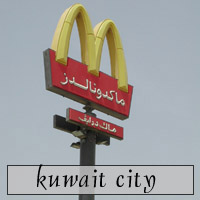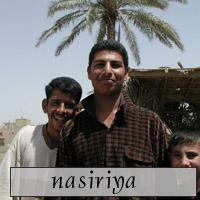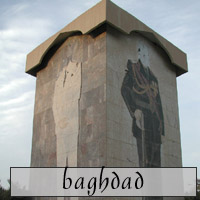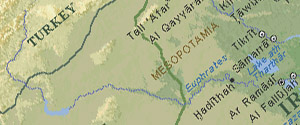
|
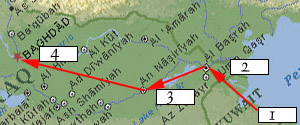
|

|

|
muslim expansion ripped through the fertile crescent of the middle east like a wildfire. islam had claimed land from india to spain and mohammed hadn't even been dead for 100 years. part of the reason for this radical expansion was that the local tribes that had originally pledged allegiance to mohammed withdrew their vote of confidence as soon as he died. prophets were a dinar a dozen back then and so it wasn't hard to find a new local favorite.abu bakr, mohammed's successor decided that local prophets weren't a good idea. after all, islam needed to be paid alms tax by these tribes around medina and mecca for military protection. they didn't need oil in those days, but the muslims did need their zakat, and so the conquests sparked more conquests and the heat of islam spread over europe and asia.
under umar ibn al-khuttab (also known as the amir-al-mum-inin - "commander of the believers") this expansion ran into a couple of problems.
first, there were problems dividing all the booty. there were the taxes to be divvied, but also loot and land. so umar set up a system called a diwan. the diwan was a list that ranked muslim soldiers. the immediate family of mohammed was at the top of the list and this was followed in chonological order by his relatives, helpers, and soldiers that had fought at badr, uhud, the riddah wars, and other key battles in the start-up days. so your position on the list determined what slice of the pie you got when a town was taken.
second, when the muslim soldiers would get ahold of a town they'd start getting a little out of hand and, shall we say, mingling with the locals. control got tricky so umar set up separate villages for the soldiers to live in called amsars. the soldiers would live there, within sword's reach of the town and under the watchful eye of whatever general was in charge of the takeover. so islam kept itself, always, a little apart from the pagan clusters they'd conquered.
nowdays, after 1400 years, the diwan and the amsars exist, but in strange forms. the diwan has become the diwaniya, a small building outside the main house where gents gather to talk over local news with each other, smoke some shisha, and pass the evenings doing things like watching football and news on television. women don't go into the diwaniya and men don't go into the house so its become something closer to a living room than a military registry, but its a tradition that's been held in close regard until the last ten years or so.
then there's basra. in 636 it was started as an amsar. it was a religious sort of army base. like the diwaniya, the last 10 years has seen an ebb, and now the population is less than a third of what it was only a few years ago. basra, being one of the first land-battles in the iraq takeover, seemed a good place to start a visit into iraq.
i had hitched north with some reporters from the new york times (i like to hitch rides whenever possible if only because it forces me to meet new people) and so we pulled into Basra after a rather hairy and paper-frought cross into the border. basra was bombed. the sheraton hotel had been looted (though none of the hotels near it were touched). there were kids, that feature of warzones i always notice. there were mosques that were untouched (most of the buildings were untouched). there was saddam's yacht, reportedly lined with mercury for a special touch of interior decoration flair. there were kids swimming nearby. there were the bombed administration buildings, and a local guy i met who introduced me to his father.














he took me over to saddam's torture tanks that were built in behind Basra's national police HQ building. "These walls," someone later told me, "were walls that we could not ask questions about. Sometimes people would ask 'What is behind that wall?' and they would disappear. We knew better than to ask questions like these. one day a friend of mine, a doctor, found his son missing. two days later the police came to him and said 'we have your son. he is okay. give us money.'"
i asked my friend if the doctor paid. it seemed strange to me - that cops would do this to civilians. it seemed doubtful that they were cops.
"Of course he paid! He had to! They were the police! He paid them and then two months later they came back and said the same thing. Every two months they collected $1000 and this went on for twenty years. Five days before the american troops showed up they shot him and left his body in front of his father's house."
it seemed far-fetched to me, as if i were in a gulag or some sort of prison camp. i didnt really think that this was actually happening here. i had assumed that it was a country that was running. i had underestimated the depth of saddam's regime and, at the same time, the depth of the country's wealth.
i was one of the lucky few that got to see the nightmare behind the walls, after the dream had ended. my friend, the guide, knew about it from talking with some local police. the police worked under a threat of death. they worked under the jurisdiction of regional bosses who were themselves under threats of death. this is what, he told me, they told him. i had no real reason not to believe him. since Saddam ruled much of the party with the same tactic then i guess that, as the arab saying goes, The Fish Stinks From The Head.
we passed the main administration building, also bombed and looted, and walked back into a building that had a long yellow hallway down the center of it. off of this hallway were small rooms, about 2m x 2m wide. there was a small drain, a la toilet, in the back.
each cube was a prison cell where 15 prisoners would be kept. sometimes for a month, sometimes for years, some times for life times. i heard one story about a woman that had been tortured, daily, for 35 years. they released her two weeks ago and gave her an apartment. now she drools and draws on the wall. hard to motivate once you get out of the clink, i suppose. especially if you've had all your fuses blown from electrical treatments.




people had been writing on the walls. this first one runs along the lines of "My brother was killed here by Saddam, the bastard, may he burn in hell for all eternity." the second one, with marc lacey's facey, reads "Saddam; Son Of A Bitch" and the litanies went on and on in room after room like this. other folks left less articulate, and far smellier, symbols of hate which just contributed to the already deep stench of the place - and a stench that was not just from the shit - but it had that strange cloying nonphysical sensation when you know that many people have experienced great pain in a single place.
people, clearly, were not happy about what ole mr hussein had been doing in the small town of basra for the last 35 years.




.. and out back, a family had set up a home here, since theirs was wrecked by the british troops (along with the library).
if i had been upset with george bush before seeing this, that anger paled and settled down into a more reasonable perspective when i saw some of these stories. i found these small evidences of appreciation, on my first day in basra.. "Thank you for freedom" seemed to be a well-worn phrase around town (probably put there by british soldiers, but i'll suspend judgement on things i dont know).
but i still needed convincing. something still wasnt adding up for me. why were we there? after all, people have been doing these kinds of things to each other for millenia and the administrators of washington couldn't care less about it. so something else had to be happening in this country.
it was clear basra was wounded. i couldnt tell where the wound was (sometimes its hard to tell what is wrong when it is so goddam big, or when we are so goddam small), but i could tell it was there. basra was wounded, but it was also still very alive. people were selling vegetables, water, generators, tools, services, and friends were meeting on sidewalks, talking. i found an art gallery that was tucked into the basement of a bombed out admin building. these guys had set it up and were selling canvases out of it. one painting i found was by a painter named Manal Kheroulah. she's a 23-year old painter at the basra college of fine arts. i like that.
people are painting there, and worrying about issues larger than petroleum and torture, taking their pains out with linseed, instead.



my friend in kuwait, hussam, had sent some photos and other items along with me to give to his father when i got into basra. the border between the two countries is thick, a million miles thick, and families havent been able to see each other for decades even though they live only a couple of hours away, as the car drives. and so i was Messenger Meadows, off to deliver items to families in need. it might have been the first thing i've done in years that i knew was Good and Right. there seemed no ancillary harm, no spin-off charms, to taking candles and money to family members of friends in warzones. it was nice to be worthy, and have something to do that was truly helpful.
so at about 4pm i called hussam's father from the hotel (fortunately, that block of phones in basra was working) and asked if we could meet for a while.
we spent some four or five hours together that evening. it was my first evening in iraq and i was in for a few surprises. having him there was helpful, and might have saved my life.
when he arrived i handed him photographs of his 2-year old grandson (whom he’d never met), his daughter-in-law (whom he’d never met), his son (whom he’d never seen with long hair), a stack of cash (american), some tea i brought along from sri lanka, a pile of candles, and four cartons of cigarettes (which are worth more than cash in most warzones).
i had the pleasure of watching his face change as he read the letter. i have no idea what its like to live in a warzone and to receive a letter from your son, with reports on his family. but it seems a kind of proof of the importance of families.




if talking with mr talal was a pleasure, it was what followed that night that taught me the most. we left the hotel and walked over to his car. he told me that it was dangerous in the evenings and to stick close to him. the war - or the major battles anyway - had ended a couple of weeks before i'd arrived, but he told me that it was most dangerous now, with the looting and the vandals. before, people at least stayed inside. before, at least, there was an authority to answer to.
i think god likes to punctuate statements other people make for me since i'm clearly too stupid to get what's going on. and so it was at that moment that mr talal told me to stick with him that a gunshot was fired in a building nearby. even for me it was clear what it was; no firecrackers here in basra; these are the days.
mr talal looked at me, put his index finger to his ear, and said, "See? That's what I mean. They're everywhere." he was serious, but he smiled, too.
we drove to the middle of basra. it was dusk, but still light. i met mr talal's friends there. the old men that are playing cards and talking about their kids and sucking on water pipes full of fruits and tobaccos (there is a reason why so many cigarettes are named after middle-eastern influences). yes, basra is still alive, i thought, as we were talking with the tall man in the dishdasha who was a friend of mr talal's and who had been selling cars and who was smiling and counting money.

that was when the gunshots exploded, i thought, in my ear.
right in my hearing. i spun on my heel, in reflex, looking behind me, and saw a man in the street, also in a dishdasha, and he was squirming in the street, and it wasnt dark and the people were fanning out away from him as if he were leaking the plague and two men were standing over him, pointing the gun at his back. and as he writhed around in the street, also crawling away, he dragged blood behind him. his movements werent his own. he seemed like a mop that was held by a huge invisible devil, a devil that was using him to mop up the oil in the street.
they shot him twice more and he seemed like meat, not at all like a hollywood killing, the bullets didnt move him at all. they just entered and made him move faster. it was a vengeance killing, mr talal told me. he had been a baath party member, and the fact that he had been shot out in daylight meant that they were making a message for people. other baath party members needed to know about this. it was time for things to change.
these are the days.
an hour later we were sitting out on the sidewalk with old, old friends. they had been meeting here for 23 years and they were glad to have me there with them. i, for one, was glad to be there too. i wasn't rattled from all the firing and looting and mayhem, but i was glad to be surrounded by friends, and the old men were welcoming in that arabic way. i mean, i have never in my life been to any region of the world that is nearly as welcoming as the arabic world.
mr talal introduced me to his friend that owned the house. this is him, below, on the left, sitting in his diwaniya. the decor of the house, in fact, the decor of iraq is like this. it is a minty-fresh reverberation of the American Dream, as if it had bounced off of the coast of europe some 20 years ago and took another 20 years to wash over the deserts of arabia, where it has now stuck. yes, american culture has invaded, even, here. there were phonographs, old scooped out chairs, 1970s cadillacs, and strange pictures of elvis around. this was a wealthy man's house. in iraq, poverty looks nothing like you can find in the united states.
the diwaniya is an old tradition in which men meet and talk about the matters of their lives. i think the fact that there are so few telephones (3% of the pop) and even fewer televisions here (2% of the pop) means that these sorts of gatherings are all the more important. i dont know, really, but i was glad to be invited.
the men brought me cucumbers, tomatoes, and feta cheese to chew on while they asked me The Important Questions. they asked me what i thought of iraq. i told them that it seemed things were a bit roughed up, but the fact that friends like them still met and got together was an important indication that the country was still alive. i recommended that they continue to do so, lest they end up like kuwait.
they asked "is bush just playing with us?" they asked me "why did the US do this?" "was it for the iraqi people or the oil?" "what about israel?" "when will we have water and electricity?"
i did my best to answer the questions. i was, after all, from the outside.
i remember two things most vividly from that night. first, they brought out water for me. which was far beyond generous. it was bottled water, that was potable, and in a time of war like that, in the deserts of southern iraq, i thanked them and drank as much as i could without seeming impolite (though the sun had set it was over 110 degrees). the second thing i remember was the communist, an old man you can see framed in the light - the one sitting, with glasses on - his name was something close to "Fayedh" .. he told me several interesting things. first, he had been at the bank in basra when the british troops shot it open and he watched as they then backed up and allowed people in to loot the vaults. he told me "if the sun never sets on english soil, then it never rises, either" and he pointed out that if the devil himself had invaded iraq and deposed saddam that the iraqis would have been happy.
he was an old man, perhaps 80, and he was active, and when i left he gave me kisses on my cheek and thanked me.




i went back to the hotel with mr talal in the car. i had a cigarette and watched the arabic prayers and noticed, for the first time, what a sad, sad culture has soaked over iraq. the prayers themselves, just to listen to the koran, and you can hear the destitution, the abject supplication, the weeping and moaning is not something that is staged, like military rigor, for the benefit of the people. this country is sad, and is weeping, after so many thousands of years of hardships.
i've heard from more than one iraqi mouth - more than a dozen (in fact it might have been a unanimous opinion) - that islamic fundamentalism was a result of the united states waging its war against russia. that the united states exacerbated this approach to islam as a means of forming a weapon against soviet russia in afghanistan. and now, the weapon has grown its own intentions.
i dont know. i just know its sad to listen to, its sad to see, its sad to be near. something deep, deep down in the system is broken. some bone of the ethos has been snapped and can never be mended. something, there, is very deeply sad.
